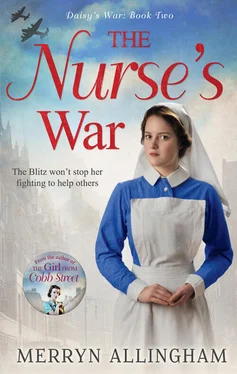Even if the underground was marginally safer, it was not a place she wanted to be. The platforms would be overcrowded, she knew, fetid with the smell of unventilated bodies packed as close as sardines. But she had no choice, and could only hope that her patients were right when they’d said that stations had become more civilised over the last year, with sanitary closets and washing facilities installed. There was even talk that at some mobile canteens had been set up to offer hot food and drink. At the entrance, a queue had already formed and, as she waited, a small scuffle broke out at the front—a few men already merry from an hour spent in a nearby public house—but otherwise an orderly trail of people were making their way down into the depths of the oldest underground station in the world. It looked it too, she thought. The Victorian tiling was dull and dirty, left uncleaned since the war began, and the grind of ancient escalators was no more comforting, jammed as they were from top to tail with people scurrying towards what they hoped was safety.
When she finally reached the platform, there were already hundreds crammed into the small space and more streaming in with every minute. A mix of people, caught together in this flash of time, sharing the irritation, the defiance, the camaraderie, the fear. By the look of them, there were a large number of locals, people who spent every night here and who Daisy could see were trying to organise the shelter into some kind of order. They had an almost impossible job. Some families had brought what appeared to be their entire household and were already setting up makeshift bunks, surrounded by their most valuable possessions. There were large numbers of women with small children; a few suburban housewives caught out by the sirens before they could get home; and several men in dinner jackets, the ladies on their arms flashing jewels, detained on their way to an evening on the town. Old people, their faces lined and weary, young shop girls and typists, a smattering of men in uniform. All wartime life, in fact.
The atmosphere was already thick and the noise intense. The trains would continue running until eleven o’clock that night and their constant rumble melded with the clatter of people shifting possessions, calming children, nursing babies, chattering over thermos flasks. One or two noisy disputes temporarily topped the ceaseless buzz, people quarrelling over what cramped space there was left. She tried to pick her way through to a small area she’d spied at the very end of the platform. It was a mere postage stamp of a space, but, with luck, she might find fresh air funnelled from the surface. Inching forward, trying to keep her feet, she hardly noticed the people she moved through. They were simply bodies to negotiate, elbows to avoid, legs not to stumble against. She was concentrating so hard that it came as pure shock when she felt herself pushed forcibly to one side. A man, her mind told her in the instant before she felt herself losing balance, it was a man who’d pushed her. She teetered dangerously on the edge of the platform, hovering for a moment in the air above the live rail. Then, out of nowhere, a pair of strong hands took hold of her arms and held her tightly. There was a voice from what seemed a long way away, but she could make no sense of it.
‘Daisy?’ it questioned. Then, ‘ It was you !’
She was finding it difficult to understand what had just happened. The push had almost certainly been deliberate, but why? And who had done it? There had barely been time to register a face—a blurred outline only. Now she felt herself being steadied and looked up into a pair of deep blue eyes, eyes that she knew well.
‘It was you at my office?’ he asked, and this time his question needed an answer.
She drew a deep breath before she said, ‘Yes.’ The mysterious attacker was forgotten. It was almost a relief to own up to her visit.
‘On a matter of national importance?’
The crinkle at the corner of his eyes and the familiar wide smile encouraged confession. She felt oddly light as the tension trickled away. ‘I’m afraid I lied. How did you know it was me?’
‘Miss Strachan gave me a detailed description. You made an impression on her.’
Miss Strachan had not been slow in making her own impression, Daisy thought, but perhaps now wasn’t the time to mention it.
‘She said you appeared agitated and hadn’t wanted to wait. It takes some time to come from the fifth floor, you know. I was on my way.’ His tone was only slightly reproving.
‘It wasn’t that. I would have waited, but … I couldn’t go through with it.’ The words came out in a rush, ill suited and too dramatic.
‘Is calling on an old friend such an ordeal?’
He made it sound so easy and she wished it were. She reached up to push the damp curls from her face and her hand pulled at first one strand of hair and then another. ‘It didn’t feel right, that’s all. I was there under false pretences.’
He didn’t respond to this confession and his gaze remained steady. Then he took hold of her hand and, before she could protest, led her through the maze of family groups, towards the empty space she had spied earlier. ‘This is where you were making for, I think. We can talk here.’
Other people had been quick to spot the same refuge and it had now shrunk to even smaller proportions. They settled themselves as best they could, squashed against the furthermost corner of the tiling before it lost itself along the tunnel. She was uncomfortable, hemmed in on all sides, and swamped by his physical presence. She’d forgotten how cool and fresh his skin smelt. It was distracting at a time when she needed her wits about her.
‘So why the pretence?’
‘I had to see you and she—Miss Strachan—was insistent that I must have an appointment. But today is my only free day. I’m on duty for the rest of the week.’
‘It sounds as though it might be something of national importance after all.’
‘It’s a personal matter,’ she murmured. So personal that now she’d arrived at the moment the impossibility of conveying Gerald’s demand hit her with an unforeseen force. She felt her breath stutter and words go missing.
‘Tell me,’ he urged. His hand rested lightly on her forearm, a gesture of friendship, of solidarity. ‘You’ve braved meeting me again, so it must be serious.’
Daisy looked down at her hands and noticed they were clenching and unclenching. He must have noticed, too, and realised how hard this was for her.
‘It was about your work,’ she managed to say at last. At least that was true, but far too vague. It was the best she could do though.
‘My work?’
‘How is it going?’ She’d ducked the question she should be asking.
‘Fine.’ His eyes narrowed. ‘It’s going fine.’ An uneasy silence opened between them and in her mind it filled the entire station, blotting out the chatter, the laughter, the raised voices.
‘Did I tell you I’d jumped horses?’ He was trying to fill the yawning gap and she was grateful. ‘Not exactly jumped,’ he continued, ‘more of a sideways manoeuvre.’
‘You said something about new colleagues, I think. I don’t remember the details.’
‘That’s hardly surprising. Anyway, I’m working for Special Operations now. What’s left of the SIS after last year’s split is still with the Foreign Office, but I got lucky.’
‘Why lucky?’
‘The SOE is far less demure—it can even be a tad exciting. The Foreign Office seems positively staid by comparison.’
She’d always felt that Grayson was cut out for adventure, and it looked as though he’d finally found it. His masquerade as a district officer in Jasirapur had never quite rung true.
Читать дальше












